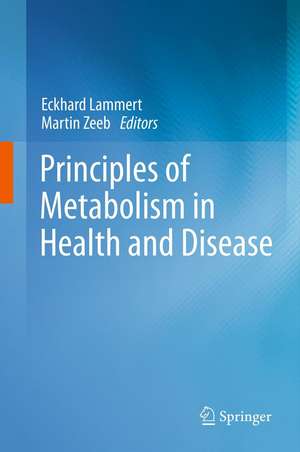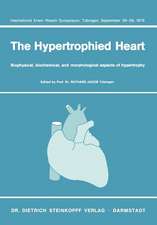Metabolism of Human Diseases: Organ Physiology and Pathophysiology
Editat de Eckhard Lammert, Martin Zeeben Limba Engleză Paperback – 24 iun 2014
Preț: 665.61 lei
Preț vechi: 700.63 lei
-5% Nou
Puncte Express: 998
Preț estimativ în valută:
127.38€ • 138.32$ • 106.100£
127.38€ • 138.32$ • 106.100£
Carte tipărită la comandă
Livrare economică 22 aprilie-06 mai
Preluare comenzi: 021 569.72.76
Specificații
ISBN-13: 9783709107140
ISBN-10: 3709107148
Pagini: 416
Ilustrații: IX, 416 p. 112 illus., 21 illus. in color.
Dimensiuni: 178 x 254 x 20 mm
Greutate: 0.74 kg
Ediția:2014
Editura: SPRINGER VIENNA
Colecția Springer
Locul publicării:Vienna, Austria
ISBN-10: 3709107148
Pagini: 416
Ilustrații: IX, 416 p. 112 illus., 21 illus. in color.
Dimensiuni: 178 x 254 x 20 mm
Greutate: 0.74 kg
Ediția:2014
Editura: SPRINGER VIENNA
Colecția Springer
Locul publicării:Vienna, Austria
Public țintă
GraduateCuprins
Introduction.- Brain: Overview.- Major depressive disorder.- Schizophrenia.- Epilepsy.- Parkinson’s disease.- Alzheimer’s disease.- Migraine and cluster headache.- Multiple sclerosis.- Down syndrome.- Eye: Overview.- Age-related macular degeneration.- Glaucoma.- Teeth and bones: Overview: Dental caries.- Osteoporosis.- Joints: Overview.- Osteoarthritis.- Rheumatoid arthritis.- Gastrointestinal tract: Overview.- Peptic ulcer disease.- Gastroenteritis.- Lactose intolerance.- Colorectal cancer.- Pancreas: Overview.- Diabetes mellitus.- Liver: Overview.- Cirrhosis.- Fat tissue: Overview.- Metabolic syndrome.- Lung: Overview.- Asthma.- COPD.- Community-acquired pneumonia.- Heart: Overview.- Atherosclerotic heart disease.- Heart failure.- Blood vessels: Overview.- Stroke.- Varicose Veins.- Blood: Overview.- Sickle Cell Disease.- Hyperlipidemia.- Immune system: Overview.- Fever.- Sepsis.- Allergies.- Kidney: Overview.- Hypertension.- Chronic kidney disease.- Gout and hyperuricemia.- Urinary tract infections.- Kidney stones.- Reproductive system: Overview.- Breast cancer.- Prostate cancer.- Cancer: Overview.
Notă biografică
Professor Eckhard Lammert, PhD. Studies of Biochemistry and Molecular Biology at the University of Hamburg, Germany. In 1995 Master thesis at the German Cancer Research Center (DKFZ), University of Heidelberg. In 1998 PhD at the Eberhard Karls University Tübingen, Germany. Four year postdoctoral research at the Harvard University in Cambridge, MA, USA. From 2002 to 2008 Research Group Leader at the Max-Planck Institute of Molecular Cell Biology and Genetics in Dresden, Germany. Since 2008 Full Professor and Head at the Institute of Metabolic Physiology at the Heinrich Heine University Düsseldorf, Germany, and since 2013 also Director of the Institute for Beta Cell Biology at the German Diabetes Center (DDZ). Research Interests: blood vessel formation, onset of type II diabetes mellitus in connection with vascular changes; cell-cell interactions in pancreatic islets, insulin secretion. For his work on type II diabetes mellitus Eckhard Lammert received the Paul-Ehrlich-und-Ludwig-Darmstaedter-Young-Investigator-Award in 2008 and the Research Award of the Klüh Foundation in 2013.
Martin Zeeb, PhD. Studies of Biochemistry at the Eberhard Karls University Tübingen, Germany. In 2008, Master Thesis at the Institute of Anatomy, Eberhard Karls University Tübingen, Germany with Prof. Thomas Skutella. In 2013, PhD in Bíology at the Institute of Metabolic Physiology, Heinrich Heine University Düsseldorf, Germany with Prof. Eckhard Lammert. Since 2013, PostDoc in CardioMetabolic Diseases Research at Boehringer Ingelheim Pharma GmbH & Co KG in Biberach (Riss), Germany. Professional Interests: Vascular biology, Organ development and regeneration, Retinal diseases, Public availability and comprehension of natural sciences, Didactics.
Martin Zeeb, PhD. Studies of Biochemistry at the Eberhard Karls University Tübingen, Germany. In 2008, Master Thesis at the Institute of Anatomy, Eberhard Karls University Tübingen, Germany with Prof. Thomas Skutella. In 2013, PhD in Bíology at the Institute of Metabolic Physiology, Heinrich Heine University Düsseldorf, Germany with Prof. Eckhard Lammert. Since 2013, PostDoc in CardioMetabolic Diseases Research at Boehringer Ingelheim Pharma GmbH & Co KG in Biberach (Riss), Germany. Professional Interests: Vascular biology, Organ development and regeneration, Retinal diseases, Public availability and comprehension of natural sciences, Didactics.
Textul de pe ultima copertă
“Metabolism of Human Diseases” examines the physiology of key organs (e.g. brain, eye, lung, heart, blood vessels, blood, immune system, gastrointestinal tract, pancreas, liver, fat tissue, kidney, reproductive system, teeth, bone and joints) and how defective metabolism and signaling pathways within these organs contribute to common human diseases. The latter include depression, schizophrenia, epilepsy, Parkinson's disease, Alzheimer's disease, migraine, multiple sclerosis, Down syndrome, macular degeneration, glaucoma, asthma, COPD, pneumonia, atherosclerotic heart disease, heart failure, stroke, varicose veins, Sickle cell disease, hyperlipidemia, fever, sepsis, allergies, peptic ulcer, gastroenteritis, lactose intolerance, colon cancer, diabetes, cirrhosis, metabolic syndrome, hypertension, chronic kidney disease, gout, urinary tract infections, kidney stones, dental caries, osteoporosis, osteoarthritis, rheumatoid arthritis, breast cancer and prostate cancer. The book also describes commonly used drugs and explains their molecular targets. It provides the first comprehensive and detailed summary of the metabolism of individual organs and their physiological and pathological functioning. Thus it serves as a useful supplement to previous textbooks of human physiology. “Metabolism of Human Diseases” is a must-have, state-of-the-art textbook written by International experts for graduate students, postdocs and scientists in metabolic research, biochemistry, physiology and pharmacy as well as for physicians interested in molecular mechanisms underlying common human diseases.
Caracteristici
First book of this kind describing principles of metabolism in key organs of the human body Comprehensive and detailed summary of organ physiological and pathological functioning with focus on biochemical metabolism Clearly structured and sorted Starts with an overview of the molecular metabolism in a specific organ, describes defective functioning during organ disease and ends with possible treatments and their consequences Metabolic pathways involved in common human diseases are highlighted




















